Analyzing Attitudes and Behaviors in Psychology: PS490 Assignment
VerifiedAdded on 2023/05/31
|7
|1838
|103
Homework Assignment
AI Summary
This assignment delves into the critical concepts of attitudes and behaviors within the field of psychology. It begins by defining attitudes as a complex interplay of emotions, beliefs, and behaviors, influenced by experience and upbringing. The paper dissects attitudes into cognitive, affective, and behavioral components, and distinguishes between explicit and implicit attitudes. It examines factors shaping attitude formation, including experience, social influences, and learning through conditioning and observation. The assignment then explores the intricate relationship between attitudes and behaviors, highlighting factors that affect attitude strength and the likelihood of behavioral alignment. Furthermore, it discusses various theories of attitude change, such as learning theory, the Elaboration Likelihood Model, and dissonance theory. The paper concludes by emphasizing the importance of understanding these concepts for psychologists in effectively addressing client needs and behaviors.
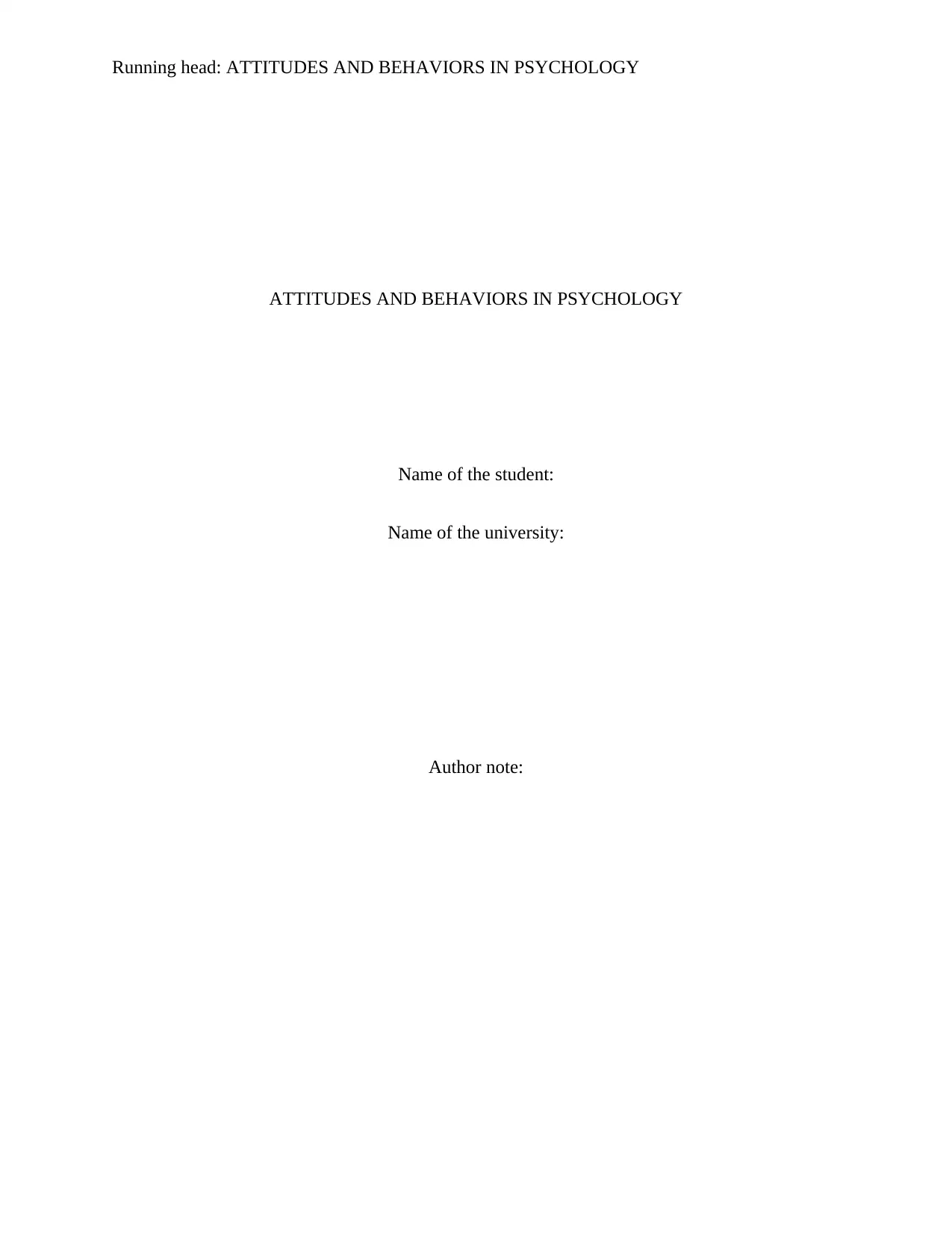
Running head: ATTITUDES AND BEHAVIORS IN PSYCHOLOGY
ATTITUDES AND BEHAVIORS IN PSYCHOLOGY
Name of the student:
Name of the university:
Author note:
ATTITUDES AND BEHAVIORS IN PSYCHOLOGY
Name of the student:
Name of the university:
Author note:
Paraphrase This Document
Need a fresh take? Get an instant paraphrase of this document with our AI Paraphraser
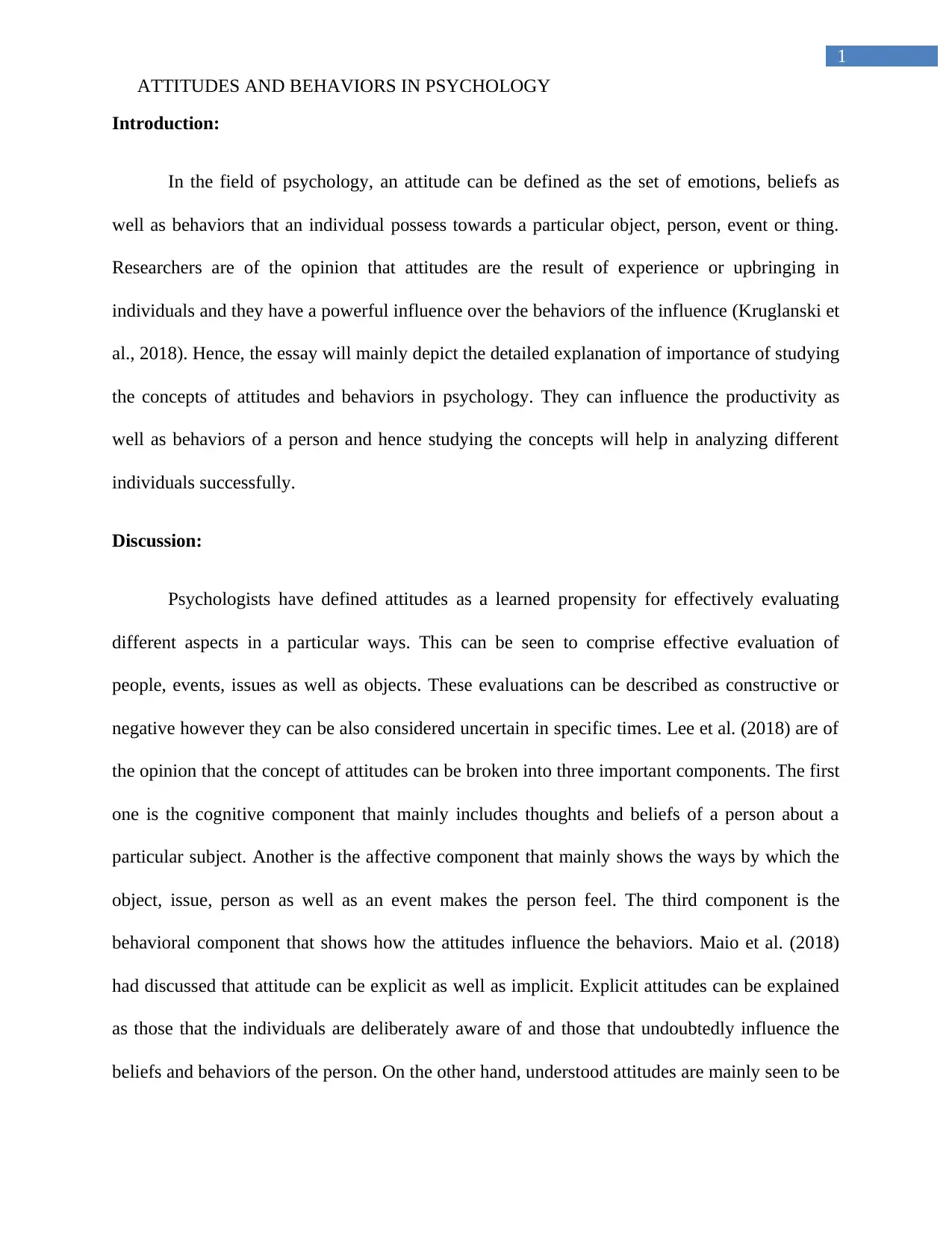
1
ATTITUDES AND BEHAVIORS IN PSYCHOLOGY
Introduction:
In the field of psychology, an attitude can be defined as the set of emotions, beliefs as
well as behaviors that an individual possess towards a particular object, person, event or thing.
Researchers are of the opinion that attitudes are the result of experience or upbringing in
individuals and they have a powerful influence over the behaviors of the influence (Kruglanski et
al., 2018). Hence, the essay will mainly depict the detailed explanation of importance of studying
the concepts of attitudes and behaviors in psychology. They can influence the productivity as
well as behaviors of a person and hence studying the concepts will help in analyzing different
individuals successfully.
Discussion:
Psychologists have defined attitudes as a learned propensity for effectively evaluating
different aspects in a particular ways. This can be seen to comprise effective evaluation of
people, events, issues as well as objects. These evaluations can be described as constructive or
negative however they can be also considered uncertain in specific times. Lee et al. (2018) are of
the opinion that the concept of attitudes can be broken into three important components. The first
one is the cognitive component that mainly includes thoughts and beliefs of a person about a
particular subject. Another is the affective component that mainly shows the ways by which the
object, issue, person as well as an event makes the person feel. The third component is the
behavioral component that shows how the attitudes influence the behaviors. Maio et al. (2018)
had discussed that attitude can be explicit as well as implicit. Explicit attitudes can be explained
as those that the individuals are deliberately aware of and those that undoubtedly influence the
beliefs and behaviors of the person. On the other hand, understood attitudes are mainly seen to be
ATTITUDES AND BEHAVIORS IN PSYCHOLOGY
Introduction:
In the field of psychology, an attitude can be defined as the set of emotions, beliefs as
well as behaviors that an individual possess towards a particular object, person, event or thing.
Researchers are of the opinion that attitudes are the result of experience or upbringing in
individuals and they have a powerful influence over the behaviors of the influence (Kruglanski et
al., 2018). Hence, the essay will mainly depict the detailed explanation of importance of studying
the concepts of attitudes and behaviors in psychology. They can influence the productivity as
well as behaviors of a person and hence studying the concepts will help in analyzing different
individuals successfully.
Discussion:
Psychologists have defined attitudes as a learned propensity for effectively evaluating
different aspects in a particular ways. This can be seen to comprise effective evaluation of
people, events, issues as well as objects. These evaluations can be described as constructive or
negative however they can be also considered uncertain in specific times. Lee et al. (2018) are of
the opinion that the concept of attitudes can be broken into three important components. The first
one is the cognitive component that mainly includes thoughts and beliefs of a person about a
particular subject. Another is the affective component that mainly shows the ways by which the
object, issue, person as well as an event makes the person feel. The third component is the
behavioral component that shows how the attitudes influence the behaviors. Maio et al. (2018)
had discussed that attitude can be explicit as well as implicit. Explicit attitudes can be explained
as those that the individuals are deliberately aware of and those that undoubtedly influence the
beliefs and behaviors of the person. On the other hand, understood attitudes are mainly seen to be
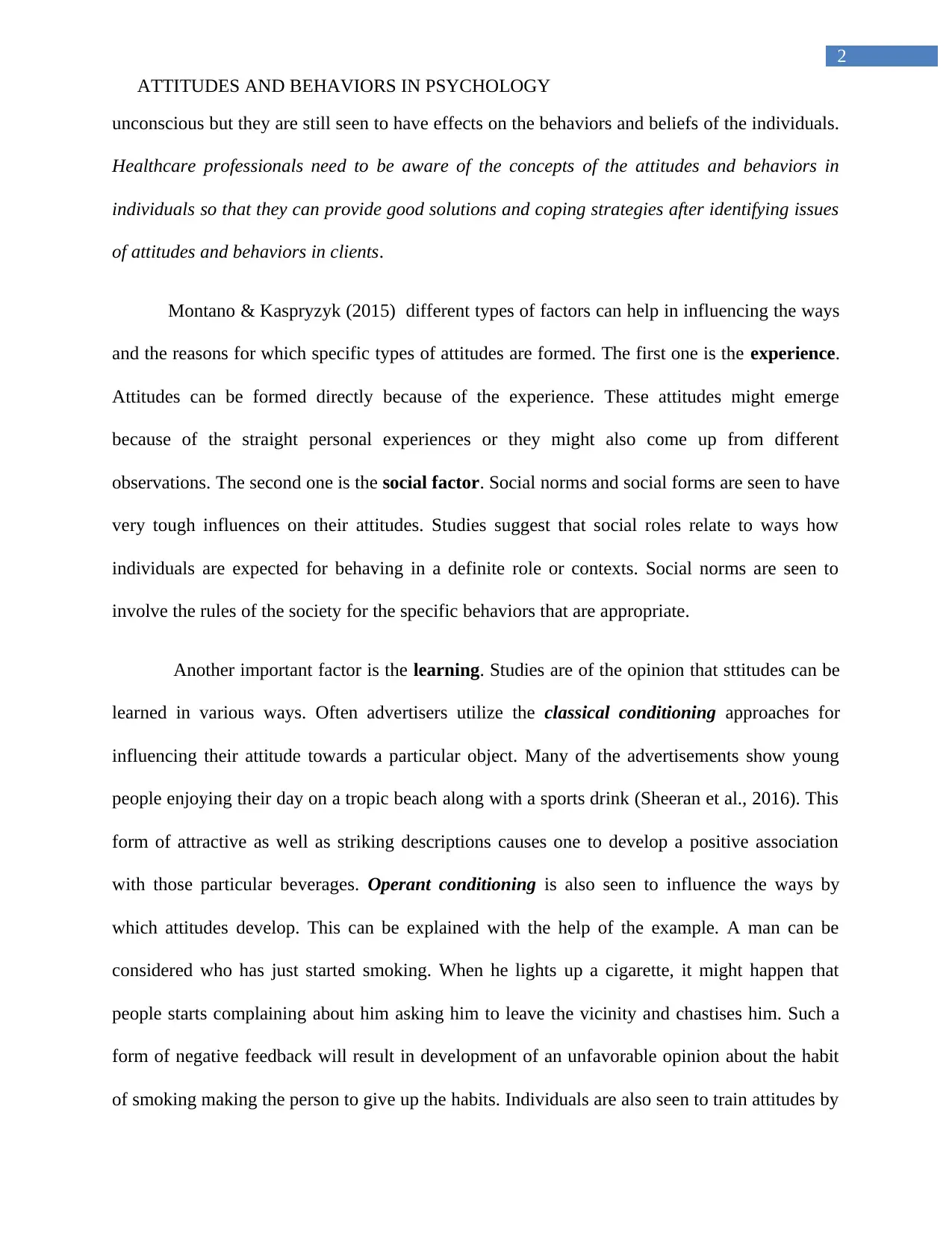
2
ATTITUDES AND BEHAVIORS IN PSYCHOLOGY
unconscious but they are still seen to have effects on the behaviors and beliefs of the individuals.
Healthcare professionals need to be aware of the concepts of the attitudes and behaviors in
individuals so that they can provide good solutions and coping strategies after identifying issues
of attitudes and behaviors in clients.
Montano & Kaspryzyk (2015) different types of factors can help in influencing the ways
and the reasons for which specific types of attitudes are formed. The first one is the experience.
Attitudes can be formed directly because of the experience. These attitudes might emerge
because of the straight personal experiences or they might also come up from different
observations. The second one is the social factor. Social norms and social forms are seen to have
very tough influences on their attitudes. Studies suggest that social roles relate to ways how
individuals are expected for behaving in a definite role or contexts. Social norms are seen to
involve the rules of the society for the specific behaviors that are appropriate.
Another important factor is the learning. Studies are of the opinion that sttitudes can be
learned in various ways. Often advertisers utilize the classical conditioning approaches for
influencing their attitude towards a particular object. Many of the advertisements show young
people enjoying their day on a tropic beach along with a sports drink (Sheeran et al., 2016). This
form of attractive as well as striking descriptions causes one to develop a positive association
with those particular beverages. Operant conditioning is also seen to influence the ways by
which attitudes develop. This can be explained with the help of the example. A man can be
considered who has just started smoking. When he lights up a cigarette, it might happen that
people starts complaining about him asking him to leave the vicinity and chastises him. Such a
form of negative feedback will result in development of an unfavorable opinion about the habit
of smoking making the person to give up the habits. Individuals are also seen to train attitudes by
ATTITUDES AND BEHAVIORS IN PSYCHOLOGY
unconscious but they are still seen to have effects on the behaviors and beliefs of the individuals.
Healthcare professionals need to be aware of the concepts of the attitudes and behaviors in
individuals so that they can provide good solutions and coping strategies after identifying issues
of attitudes and behaviors in clients.
Montano & Kaspryzyk (2015) different types of factors can help in influencing the ways
and the reasons for which specific types of attitudes are formed. The first one is the experience.
Attitudes can be formed directly because of the experience. These attitudes might emerge
because of the straight personal experiences or they might also come up from different
observations. The second one is the social factor. Social norms and social forms are seen to have
very tough influences on their attitudes. Studies suggest that social roles relate to ways how
individuals are expected for behaving in a definite role or contexts. Social norms are seen to
involve the rules of the society for the specific behaviors that are appropriate.
Another important factor is the learning. Studies are of the opinion that sttitudes can be
learned in various ways. Often advertisers utilize the classical conditioning approaches for
influencing their attitude towards a particular object. Many of the advertisements show young
people enjoying their day on a tropic beach along with a sports drink (Sheeran et al., 2016). This
form of attractive as well as striking descriptions causes one to develop a positive association
with those particular beverages. Operant conditioning is also seen to influence the ways by
which attitudes develop. This can be explained with the help of the example. A man can be
considered who has just started smoking. When he lights up a cigarette, it might happen that
people starts complaining about him asking him to leave the vicinity and chastises him. Such a
form of negative feedback will result in development of an unfavorable opinion about the habit
of smoking making the person to give up the habits. Individuals are also seen to train attitudes by
⊘ This is a preview!⊘
Do you want full access?
Subscribe today to unlock all pages.

Trusted by 1+ million students worldwide
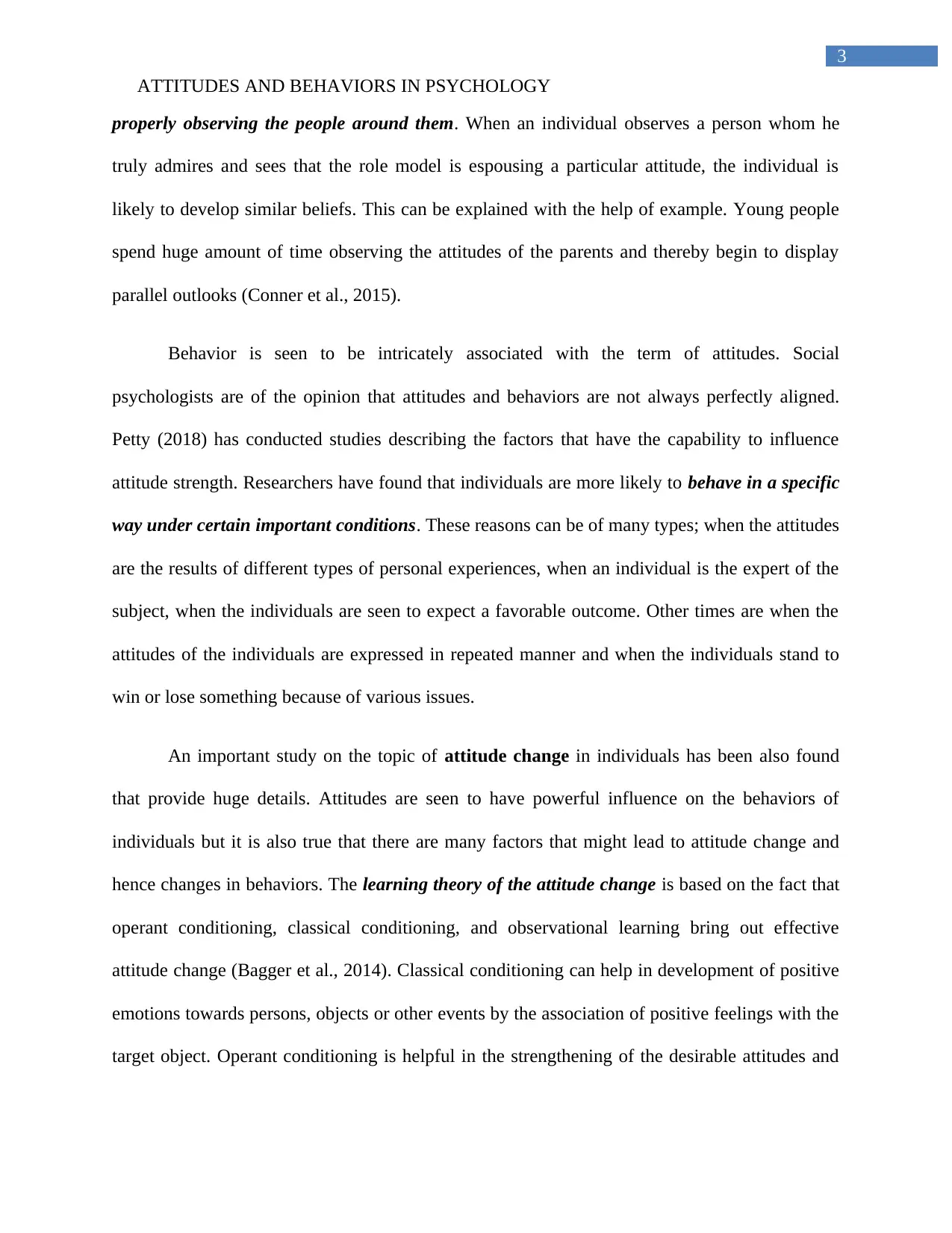
3
ATTITUDES AND BEHAVIORS IN PSYCHOLOGY
properly observing the people around them. When an individual observes a person whom he
truly admires and sees that the role model is espousing a particular attitude, the individual is
likely to develop similar beliefs. This can be explained with the help of example. Young people
spend huge amount of time observing the attitudes of the parents and thereby begin to display
parallel outlooks (Conner et al., 2015).
Behavior is seen to be intricately associated with the term of attitudes. Social
psychologists are of the opinion that attitudes and behaviors are not always perfectly aligned.
Petty (2018) has conducted studies describing the factors that have the capability to influence
attitude strength. Researchers have found that individuals are more likely to behave in a specific
way under certain important conditions. These reasons can be of many types; when the attitudes
are the results of different types of personal experiences, when an individual is the expert of the
subject, when the individuals are seen to expect a favorable outcome. Other times are when the
attitudes of the individuals are expressed in repeated manner and when the individuals stand to
win or lose something because of various issues.
An important study on the topic of attitude change in individuals has been also found
that provide huge details. Attitudes are seen to have powerful influence on the behaviors of
individuals but it is also true that there are many factors that might lead to attitude change and
hence changes in behaviors. The learning theory of the attitude change is based on the fact that
operant conditioning, classical conditioning, and observational learning bring out effective
attitude change (Bagger et al., 2014). Classical conditioning can help in development of positive
emotions towards persons, objects or other events by the association of positive feelings with the
target object. Operant conditioning is helpful in the strengthening of the desirable attitudes and
ATTITUDES AND BEHAVIORS IN PSYCHOLOGY
properly observing the people around them. When an individual observes a person whom he
truly admires and sees that the role model is espousing a particular attitude, the individual is
likely to develop similar beliefs. This can be explained with the help of example. Young people
spend huge amount of time observing the attitudes of the parents and thereby begin to display
parallel outlooks (Conner et al., 2015).
Behavior is seen to be intricately associated with the term of attitudes. Social
psychologists are of the opinion that attitudes and behaviors are not always perfectly aligned.
Petty (2018) has conducted studies describing the factors that have the capability to influence
attitude strength. Researchers have found that individuals are more likely to behave in a specific
way under certain important conditions. These reasons can be of many types; when the attitudes
are the results of different types of personal experiences, when an individual is the expert of the
subject, when the individuals are seen to expect a favorable outcome. Other times are when the
attitudes of the individuals are expressed in repeated manner and when the individuals stand to
win or lose something because of various issues.
An important study on the topic of attitude change in individuals has been also found
that provide huge details. Attitudes are seen to have powerful influence on the behaviors of
individuals but it is also true that there are many factors that might lead to attitude change and
hence changes in behaviors. The learning theory of the attitude change is based on the fact that
operant conditioning, classical conditioning, and observational learning bring out effective
attitude change (Bagger et al., 2014). Classical conditioning can help in development of positive
emotions towards persons, objects or other events by the association of positive feelings with the
target object. Operant conditioning is helpful in the strengthening of the desirable attitudes and
Paraphrase This Document
Need a fresh take? Get an instant paraphrase of this document with our AI Paraphraser
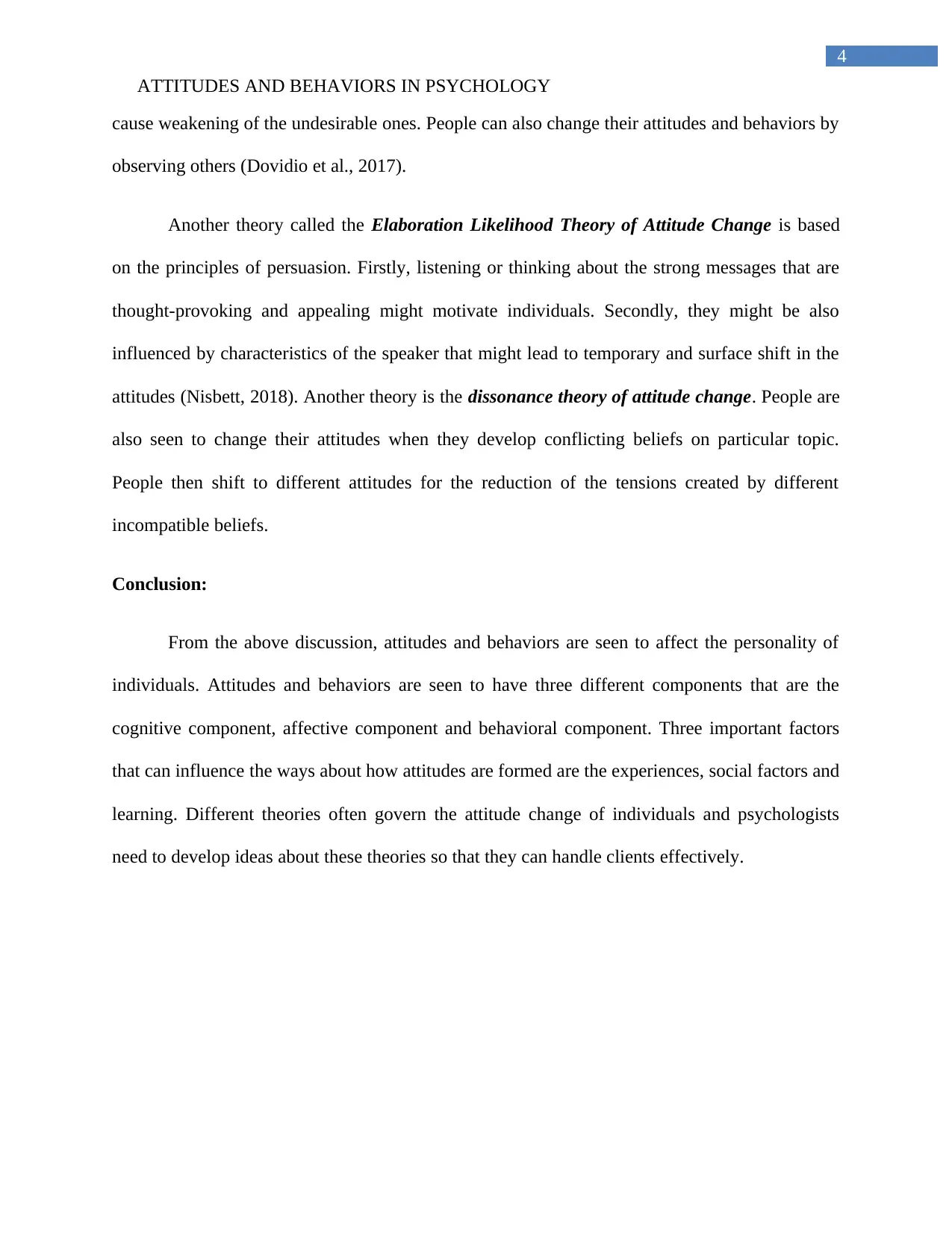
4
ATTITUDES AND BEHAVIORS IN PSYCHOLOGY
cause weakening of the undesirable ones. People can also change their attitudes and behaviors by
observing others (Dovidio et al., 2017).
Another theory called the Elaboration Likelihood Theory of Attitude Change is based
on the principles of persuasion. Firstly, listening or thinking about the strong messages that are
thought-provoking and appealing might motivate individuals. Secondly, they might be also
influenced by characteristics of the speaker that might lead to temporary and surface shift in the
attitudes (Nisbett, 2018). Another theory is the dissonance theory of attitude change. People are
also seen to change their attitudes when they develop conflicting beliefs on particular topic.
People then shift to different attitudes for the reduction of the tensions created by different
incompatible beliefs.
Conclusion:
From the above discussion, attitudes and behaviors are seen to affect the personality of
individuals. Attitudes and behaviors are seen to have three different components that are the
cognitive component, affective component and behavioral component. Three important factors
that can influence the ways about how attitudes are formed are the experiences, social factors and
learning. Different theories often govern the attitude change of individuals and psychologists
need to develop ideas about these theories so that they can handle clients effectively.
ATTITUDES AND BEHAVIORS IN PSYCHOLOGY
cause weakening of the undesirable ones. People can also change their attitudes and behaviors by
observing others (Dovidio et al., 2017).
Another theory called the Elaboration Likelihood Theory of Attitude Change is based
on the principles of persuasion. Firstly, listening or thinking about the strong messages that are
thought-provoking and appealing might motivate individuals. Secondly, they might be also
influenced by characteristics of the speaker that might lead to temporary and surface shift in the
attitudes (Nisbett, 2018). Another theory is the dissonance theory of attitude change. People are
also seen to change their attitudes when they develop conflicting beliefs on particular topic.
People then shift to different attitudes for the reduction of the tensions created by different
incompatible beliefs.
Conclusion:
From the above discussion, attitudes and behaviors are seen to affect the personality of
individuals. Attitudes and behaviors are seen to have three different components that are the
cognitive component, affective component and behavioral component. Three important factors
that can influence the ways about how attitudes are formed are the experiences, social factors and
learning. Different theories often govern the attitude change of individuals and psychologists
need to develop ideas about these theories so that they can handle clients effectively.
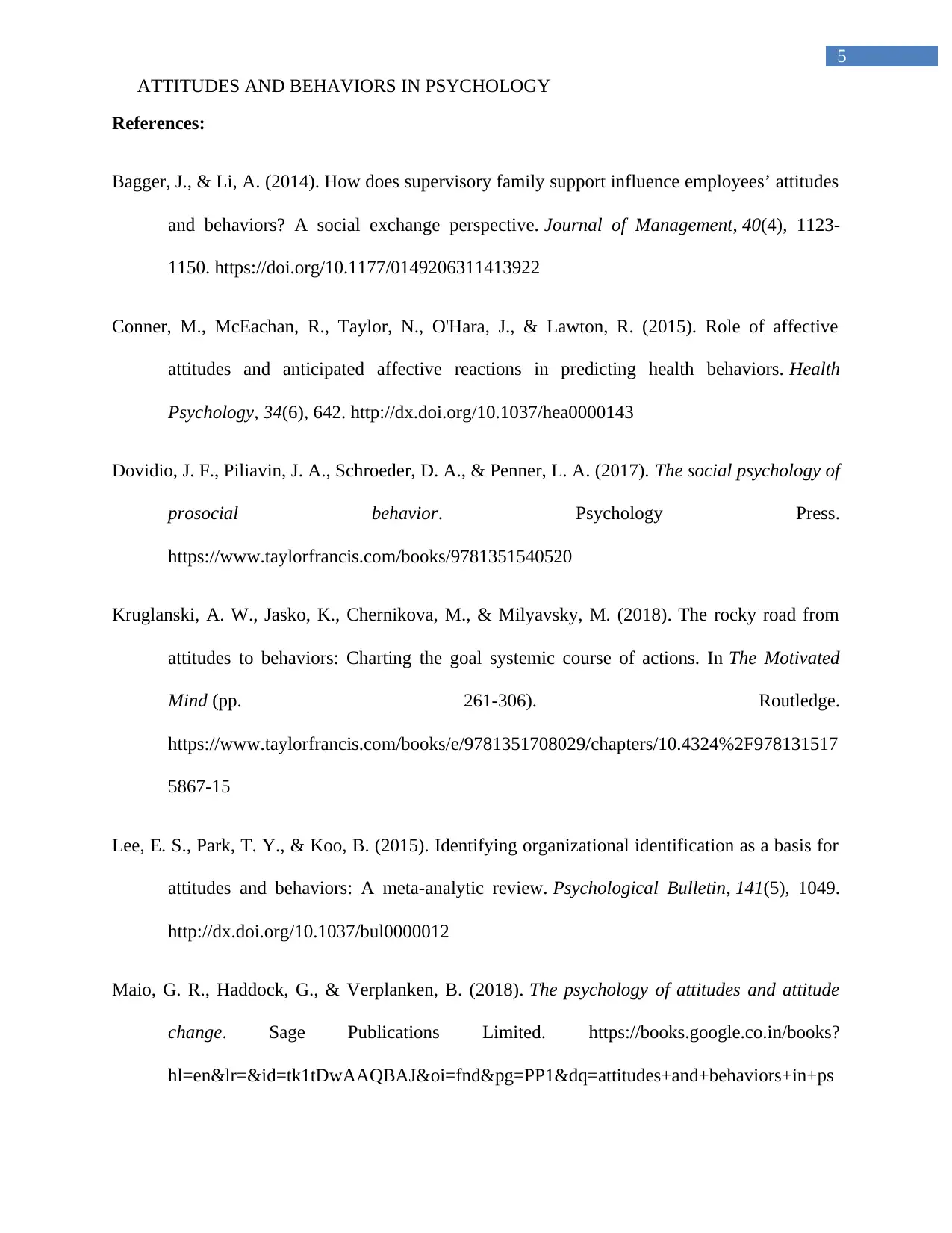
5
ATTITUDES AND BEHAVIORS IN PSYCHOLOGY
References:
Bagger, J., & Li, A. (2014). How does supervisory family support influence employees’ attitudes
and behaviors? A social exchange perspective. Journal of Management, 40(4), 1123-
1150. https://doi.org/10.1177/0149206311413922
Conner, M., McEachan, R., Taylor, N., O'Hara, J., & Lawton, R. (2015). Role of affective
attitudes and anticipated affective reactions in predicting health behaviors. Health
Psychology, 34(6), 642. http://dx.doi.org/10.1037/hea0000143
Dovidio, J. F., Piliavin, J. A., Schroeder, D. A., & Penner, L. A. (2017). The social psychology of
prosocial behavior. Psychology Press.
https://www.taylorfrancis.com/books/9781351540520
Kruglanski, A. W., Jasko, K., Chernikova, M., & Milyavsky, M. (2018). The rocky road from
attitudes to behaviors: Charting the goal systemic course of actions. In The Motivated
Mind (pp. 261-306). Routledge.
https://www.taylorfrancis.com/books/e/9781351708029/chapters/10.4324%2F978131517
5867-15
Lee, E. S., Park, T. Y., & Koo, B. (2015). Identifying organizational identification as a basis for
attitudes and behaviors: A meta-analytic review. Psychological Bulletin, 141(5), 1049.
http://dx.doi.org/10.1037/bul0000012
Maio, G. R., Haddock, G., & Verplanken, B. (2018). The psychology of attitudes and attitude
change. Sage Publications Limited. https://books.google.co.in/books?
hl=en&lr=&id=tk1tDwAAQBAJ&oi=fnd&pg=PP1&dq=attitudes+and+behaviors+in+ps
ATTITUDES AND BEHAVIORS IN PSYCHOLOGY
References:
Bagger, J., & Li, A. (2014). How does supervisory family support influence employees’ attitudes
and behaviors? A social exchange perspective. Journal of Management, 40(4), 1123-
1150. https://doi.org/10.1177/0149206311413922
Conner, M., McEachan, R., Taylor, N., O'Hara, J., & Lawton, R. (2015). Role of affective
attitudes and anticipated affective reactions in predicting health behaviors. Health
Psychology, 34(6), 642. http://dx.doi.org/10.1037/hea0000143
Dovidio, J. F., Piliavin, J. A., Schroeder, D. A., & Penner, L. A. (2017). The social psychology of
prosocial behavior. Psychology Press.
https://www.taylorfrancis.com/books/9781351540520
Kruglanski, A. W., Jasko, K., Chernikova, M., & Milyavsky, M. (2018). The rocky road from
attitudes to behaviors: Charting the goal systemic course of actions. In The Motivated
Mind (pp. 261-306). Routledge.
https://www.taylorfrancis.com/books/e/9781351708029/chapters/10.4324%2F978131517
5867-15
Lee, E. S., Park, T. Y., & Koo, B. (2015). Identifying organizational identification as a basis for
attitudes and behaviors: A meta-analytic review. Psychological Bulletin, 141(5), 1049.
http://dx.doi.org/10.1037/bul0000012
Maio, G. R., Haddock, G., & Verplanken, B. (2018). The psychology of attitudes and attitude
change. Sage Publications Limited. https://books.google.co.in/books?
hl=en&lr=&id=tk1tDwAAQBAJ&oi=fnd&pg=PP1&dq=attitudes+and+behaviors+in+ps
⊘ This is a preview!⊘
Do you want full access?
Subscribe today to unlock all pages.

Trusted by 1+ million students worldwide
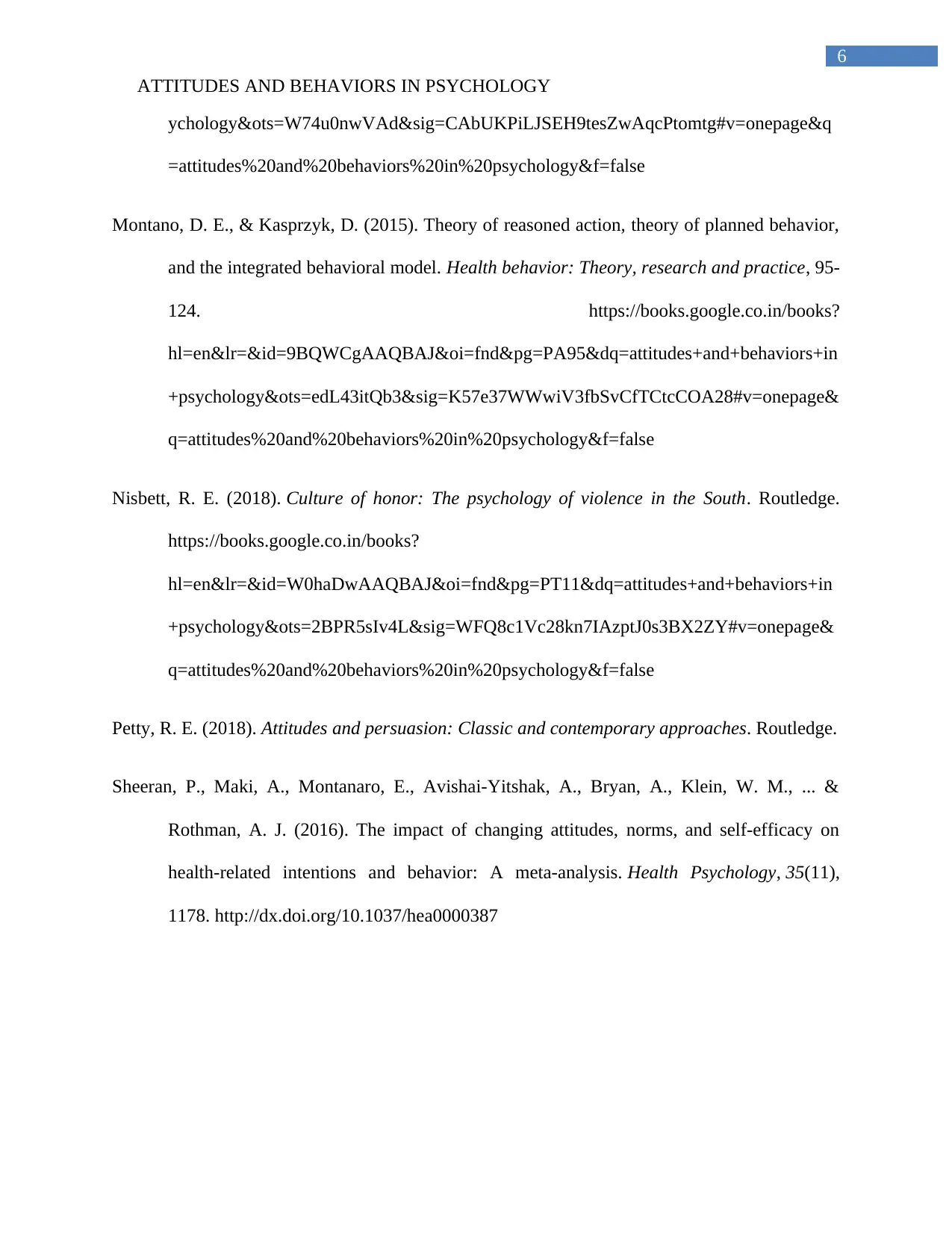
6
ATTITUDES AND BEHAVIORS IN PSYCHOLOGY
ychology&ots=W74u0nwVAd&sig=CAbUKPiLJSEH9tesZwAqcPtomtg#v=onepage&q
=attitudes%20and%20behaviors%20in%20psychology&f=false
Montano, D. E., & Kasprzyk, D. (2015). Theory of reasoned action, theory of planned behavior,
and the integrated behavioral model. Health behavior: Theory, research and practice, 95-
124. https://books.google.co.in/books?
hl=en&lr=&id=9BQWCgAAQBAJ&oi=fnd&pg=PA95&dq=attitudes+and+behaviors+in
+psychology&ots=edL43itQb3&sig=K57e37WWwiV3fbSvCfTCtcCOA28#v=onepage&
q=attitudes%20and%20behaviors%20in%20psychology&f=false
Nisbett, R. E. (2018). Culture of honor: The psychology of violence in the South. Routledge.
https://books.google.co.in/books?
hl=en&lr=&id=W0haDwAAQBAJ&oi=fnd&pg=PT11&dq=attitudes+and+behaviors+in
+psychology&ots=2BPR5sIv4L&sig=WFQ8c1Vc28kn7IAzptJ0s3BX2ZY#v=onepage&
q=attitudes%20and%20behaviors%20in%20psychology&f=false
Petty, R. E. (2018). Attitudes and persuasion: Classic and contemporary approaches. Routledge.
Sheeran, P., Maki, A., Montanaro, E., Avishai-Yitshak, A., Bryan, A., Klein, W. M., ... &
Rothman, A. J. (2016). The impact of changing attitudes, norms, and self-efficacy on
health-related intentions and behavior: A meta-analysis. Health Psychology, 35(11),
1178. http://dx.doi.org/10.1037/hea0000387
ATTITUDES AND BEHAVIORS IN PSYCHOLOGY
ychology&ots=W74u0nwVAd&sig=CAbUKPiLJSEH9tesZwAqcPtomtg#v=onepage&q
=attitudes%20and%20behaviors%20in%20psychology&f=false
Montano, D. E., & Kasprzyk, D. (2015). Theory of reasoned action, theory of planned behavior,
and the integrated behavioral model. Health behavior: Theory, research and practice, 95-
124. https://books.google.co.in/books?
hl=en&lr=&id=9BQWCgAAQBAJ&oi=fnd&pg=PA95&dq=attitudes+and+behaviors+in
+psychology&ots=edL43itQb3&sig=K57e37WWwiV3fbSvCfTCtcCOA28#v=onepage&
q=attitudes%20and%20behaviors%20in%20psychology&f=false
Nisbett, R. E. (2018). Culture of honor: The psychology of violence in the South. Routledge.
https://books.google.co.in/books?
hl=en&lr=&id=W0haDwAAQBAJ&oi=fnd&pg=PT11&dq=attitudes+and+behaviors+in
+psychology&ots=2BPR5sIv4L&sig=WFQ8c1Vc28kn7IAzptJ0s3BX2ZY#v=onepage&
q=attitudes%20and%20behaviors%20in%20psychology&f=false
Petty, R. E. (2018). Attitudes and persuasion: Classic and contemporary approaches. Routledge.
Sheeran, P., Maki, A., Montanaro, E., Avishai-Yitshak, A., Bryan, A., Klein, W. M., ... &
Rothman, A. J. (2016). The impact of changing attitudes, norms, and self-efficacy on
health-related intentions and behavior: A meta-analysis. Health Psychology, 35(11),
1178. http://dx.doi.org/10.1037/hea0000387
1 out of 7
Related Documents
Your All-in-One AI-Powered Toolkit for Academic Success.
+13062052269
info@desklib.com
Available 24*7 on WhatsApp / Email
![[object Object]](/_next/static/media/star-bottom.7253800d.svg)
Unlock your academic potential
Copyright © 2020–2026 A2Z Services. All Rights Reserved. Developed and managed by ZUCOL.





